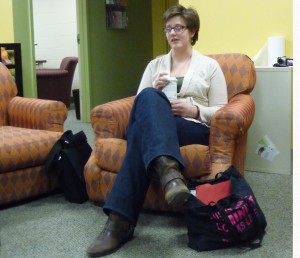
Meghan Shalvoy and Laura Kacere, campus organizers for the Feminist Majority Foundation, gave Boston University students a taste of what life could be like as a professional feminist.
As part of the Women’s Resource Center’s weekly Consciousness Raising discussion, the two spoke about pursuing their passion as their profession.
Shalvoy, who carried a black tote bag which states in bold pink letters “this is what a feminist looks like,” gave practical advice to the students as to how they could balance activism with real life activities.
“We recognize that not all of you are going to go into social justice or nonprofit work,” said Shalvoy. “But there are still ways you can integrate feminist activism into your daily life. You can advocate for more women in your workplace; you can advocate for your salary.”
Kacere added that “even if the people surrounding you aren’t necessarily open or aware, you can still bring it to the workplace.”
Kacere did this by pushing the low income community center she worked at for AmeriCorps to work with women’s prisons and by bringing sexual awareness to the center.
Kacere and Shalvoy, who both were presidents of their college’s feminist organizations, stressed the importance of volunteering and activism in college.
“It’s one thing to eloquently write about your passion in cover letters, and it’s another to spend every Saturday volunteering at women’s prisons,” said Shalvoy. “Exercise your passion, make it tangible.”
Shalvoy and Kacere also stressed the importance of getting your name out there and networking with others for future social justice jobs. But students in attendance were concerned that to network and get your name out there, you had to do a lot of unpaid internships and jobs, which some said they couldn’t afford to do.
“If our President [Eleanor Smeal] was here right now, she would say that ‘our volunteers aren’t paid because we want someone with passion and to not use money as an incentive’.”
Shalvoy addressed that this kind of dilemma is due to the structure of non-profits. She gave practical advice as to how to remedy this, something which had worked for her.
“You don’t have to worry about getting your ideal job right after college,” said Shalvoy. “You can work at a job, like I did, at Starbucks, and save up money. And because it’s a flexible job, you can still pursue activism and volunteering and make those connections.”
Many students in attendance were seniors, eagerly looking for jobs after graduation.
College of Communication senior Amy Mahler said that the discussion gave her “new avenues” to look for jobs. Mahler hopes to work her way up to being the Communication Director at a lobbying group or non-profit, like EMILY’s list, a group which raises money for progressive female candidates in tight races.
Mahler said that, for her, “it’s about balancing principles and practicality.”
Consciousness Raising discussions are held every Thursday at 5 p.m. at the Women’s Resource Center.

